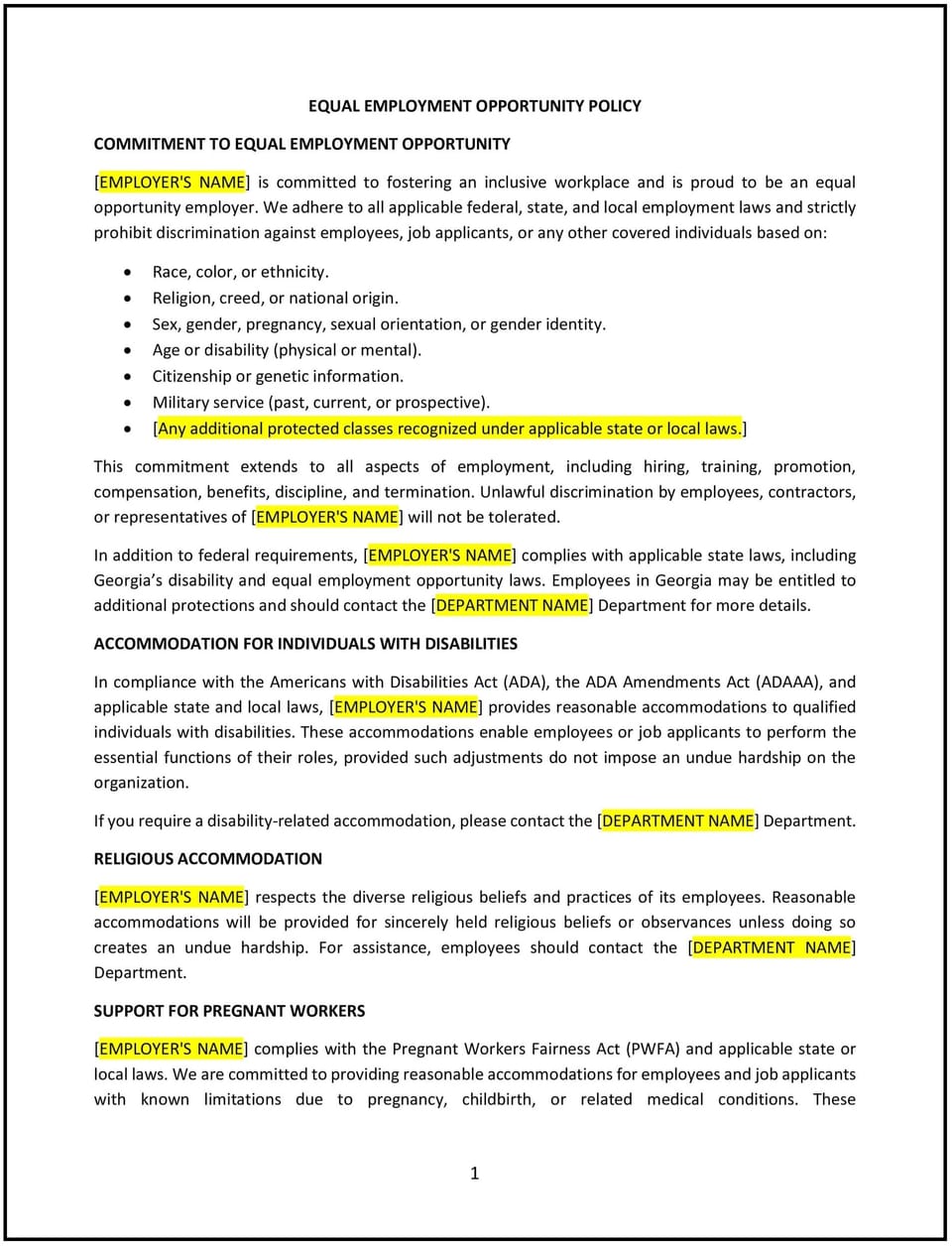Equal employment opportunity policy (Georgia): Free template

Equal opportunity employment policy (Georgia)
This equal opportunity employment (EEO) policy is designed to help Georgia businesses create a fair and inclusive workplace by establishing guidelines that prohibit discrimination and promote equitable treatment in all aspects of employment. The policy reflects a commitment to diversity, fairness, and respect for all employees and applicants.
By implementing this policy, businesses can foster a positive and equitable work environment while aligning with ethical and professional standards.
How to use this equal opportunity employment policy (Georgia)
- Define equal opportunity: Clearly outline that employment decisions will be based on qualifications, skills, and merit, without regard to characteristics such as race, gender, age, disability, religion, or other protected attributes.
- Establish coverage areas: Specify that the policy applies to all aspects of employment, including hiring, promotions, training, compensation, benefits, and terminations.
- Outline the complaint process: Provide a clear procedure for employees to report instances of discrimination or bias, including how to file complaints and the timeline for responses.
- Assign responsibilities: Designate a specific person or team to handle EEO-related issues and ensure that complaints are addressed promptly and fairly.
- Promote inclusivity: Encourage managers and employees to foster a workplace culture that values diversity and mutual respect.
- Provide training: Offer regular training to all employees and managers on equal opportunity principles, unconscious bias, and appropriate workplace conduct.
- Communicate regularly: Share the policy with employees during onboarding and periodically through internal communications to reinforce its importance.
- Review and update regularly: Periodically review the policy to reflect changes in Georgia laws, workplace dynamics, or best practices.
Benefits of using this equal opportunity employment policy (Georgia)
Implementing this policy provides several advantages for Georgia businesses:
- Fosters inclusivity: Promotes a workplace culture that values diversity and equitable treatment for all employees.
- Attracts top talent: An EEO policy demonstrates the company’s commitment to fairness, making it more appealing to a diverse range of candidates.
- Enhances employee engagement: Employees feel valued and respected, leading to improved morale and productivity.
- Reduces legal risks: Clear guidelines help businesses avoid potential discrimination claims.
- Reflects Georgia-specific considerations: Tailoring the policy to local workforce demographics and business practices ensures its relevance and effectiveness.
Tips for using this equal opportunity employment policy (Georgia)
- Communicate openly: Ensure all employees understand the policy and how it applies to their roles and responsibilities.
- Lead by example: Encourage managers to model inclusive and equitable behavior in their daily interactions and decisions.
- Address issues promptly: Take swift action to investigate and resolve complaints of discrimination or bias.
- Encourage feedback: Invite employees to share ideas for improving inclusivity and addressing potential barriers to equity.
- Monitor outcomes: Regularly assess the effectiveness of the policy and make adjustments based on employee feedback or workplace trends.
Q: What is the purpose of this policy?
A: The purpose is to establish guidelines that promote fairness and prohibit discrimination in all aspects of employment, fostering an inclusive workplace.
Q: Who does this policy apply to?
A: The policy applies to all employees and applicants, covering all employment-related decisions, including hiring, promotions, training, and terminations.
Q: How can employees report discrimination?
A: Employees should report incidents of discrimination to the designated EEO officer or HR, following the complaint procedure outlined in the policy.
Q: Are managers held to higher standards under this policy?
A: Yes, managers are expected to model inclusive behavior, support the policy, and address potential issues proactively.
Q: How can businesses ensure employees understand this policy?
A: Businesses should provide training during onboarding, host regular refresher sessions, and share updates through internal communications.
Q: What actions will be taken if a complaint is validated?
A: Depending on the severity of the issue, actions may include counseling, training, disciplinary measures, or termination of the offender’s employment.
Q: How often should this policy be reviewed?
A: The policy should be reviewed annually or as needed to reflect changes in Georgia laws or workplace practices.
This article contains general legal information and does not contain legal advice. Cobrief is not a law firm or a substitute for an attorney or law firm. The law is complex and changes often. For legal advice, please ask a lawyer.


